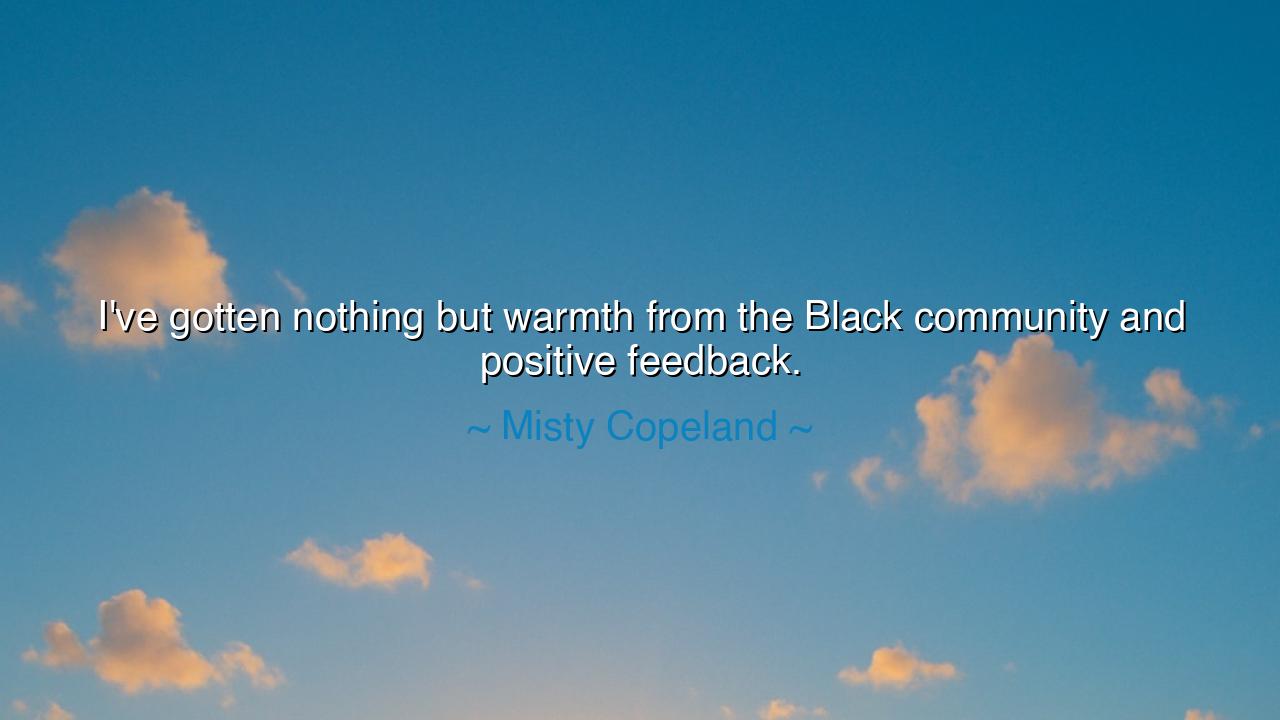
I've gotten nothing but warmth from the Black community and






Hear now the words of Misty Copeland: “I’ve gotten nothing but warmth from the Black community and positive feedback.” Though simple in sound, this utterance bears the weight of centuries, and it shines with the light of belonging, strength, and the sacred fire of kinship. For in this declaration lies not only personal gratitude, but also the echo of a people’s embrace—a community that shields, uplifts, and blesses its children with warmth when the winds of the world grow cold.
To receive positive feedback is not merely to hear praises; it is to be acknowledged, to be seen, and to be affirmed in one’s humanity. In the trials of Misty Copeland’s life, where barriers of tradition and exclusion stood high, this warmth was no small thing—it was the shield of encouragement that allowed her to rise. She, a ballerina of color in a world that often worshipped uniformity, drew strength from the roots of her community. Their voices whispered: “You belong. You are enough. Dance, and let the world witness the beauty that springs from resilience.”
Let us recall the story of Marian Anderson, the great contralto who was once denied the stage of Constitution Hall because of the color of her skin. The world tried to silence her, yet her people did not. They lifted her, they supported her, and with their strength, she sang before the Lincoln Memorial in 1939, her voice soaring above injustice. Like Misty, she drew from the warmth of her community, and it gave her the courage to stand firm, turning rejection into a song of triumph that stirred a nation.
So it is with Misty Copeland. In every pirouette, in every leap, she carries not only her own strength but also the invisible hands of her ancestors and her kin. The Black community, having known suffering and endured storms, has always sown seeds of encouragement for those who dared to rise. Their positive feedback is not idle applause—it is the voice of history saying, “Go forth, for you are our hope, and your success is the fruit of our collective struggle.”
What lesson, then, can the seeker draw from this? That no soul ascends alone. Behind every figure who stands on the stage of greatness, there is a circle of unseen companions—family, community, ancestors—whose warmth is the soil from which greatness grows. And equally, each of us has the power to be such a source of light for another. To encourage, to uplift, to say, “I see you, and I believe in you,” is to become part of the eternal chain that binds generations in strength.
Therefore, let the wise cultivate the art of positive feedback. Speak words of life into the hearts of those around you, especially when the world denies them. Offer encouragement freely, for your voice may be the fire that keeps another soul burning. And let us not forget to cherish the warmth of community, for in its embrace lies resilience, courage, and the power to defy isolation.
Practical wisdom calls us to three daily acts: First, give praise where it is due, and do not withhold affirmation from those who strive. Second, remember your own roots, and draw strength from the communities that have shaped you. Third, when you find yourself lifted by others, do not forget to return the same warmth—for in giving, the circle remains unbroken.
So let us, children of the future, walk with this truth: warmth begets strength, and feedback kindles courage. Misty Copeland’s words are not hers alone—they are the anthem of all who have ever risen because a people believed in them. Carry this torch, and pass it on, that no soul may stand in darkness without the embrace of a community’s light.






NQLuong Nhu Quyen
This quote also prompts reflection on the significance of gratitude and acknowledgment. How does Copeland express appreciation for the community’s support, and how might that reciprocally strengthen connections with fans and aspiring dancers? Does this feedback motivate her to create programs, workshops, or mentorship opportunities specifically aimed at empowering Black youth in ballet? Exploring these aspects can illustrate the interplay between personal success and community engagement in driving positive change.
DTTIen Dat Tran
Reading this makes me think about the role of feedback in shaping public figures’ impact. How do positive responses from one community empower Misty Copeland to become a role model for younger generations? Could this kind of support inspire initiatives to make ballet more accessible and inclusive? Understanding the ripple effect of encouragement might highlight how individual experiences of validation contribute to cultural change and representation.
TDHuynh Tan Dat
I find this perspective encouraging, but it also raises questions about broader inclusivity. While Copeland experiences warmth from the Black community, does she also receive acknowledgment and support from the wider ballet world? How do these intersecting forms of recognition affect her influence and ability to challenge stereotypes? Considering these factors could shed light on the complexities of navigating success as a pioneer in a traditionally exclusive field.
TP26. Mai Trong Phuc
This statement sparks curiosity about the dynamics of community support. How has the warmth and positive feedback from the Black community impacted Misty Copeland personally and professionally? Has it influenced her confidence, performance, or decision-making in ballet? Exploring this could reveal how cultural affirmation can help individuals overcome systemic barriers and thrive in spaces where they have been historically underrepresented.
PTphan phuong trinh
Misty Copeland’s experience highlights the importance of representation in the arts. I wonder how her visibility as a Black ballerina has influenced aspiring dancers in her community. Does receiving positive feedback reinforce her role as a trailblazer, and how does it shape her approach to mentorship and advocacy? It’s also interesting to consider how support from the community contributes to resilience in an industry historically lacking diversity.